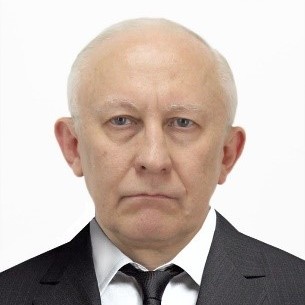
– International Engineering Technological University; department biochemical engineering; associate professor (2022 – 2023)
– Al-Farabi Kazakh National University; Faculty of Physics and Technology; Department of Solid State Physics and Nonlinear Physics; senior lecturer (2011 – 2022).
– Al-Farabi Kazakh National University; Faculty of Physics; Laboratory of Semiconductor Instrumentation, Senior Researcher (1992 – 2011).
– S.M. Kirov KazSU; linear accelerator Laboratory; engineer of the research sector (1990 – 1992).
– KazPI named after Abai; linear accelerator laboratory; engineer of the research sector (1987 – 1990).
1979 - 1987 S.M. Kirov Kazakh State University. Physicist. Teacher.
2001 - 2004 al-Farabi Kazakh National University, full-time postgraduate study. 01.04.07 – condensed matter physics.
3822/GF4 "Development of the internal structure of metamaterials and the study of their electrophysical and quasi-optical properties" under the Grant funding program for scientific research in 2015, project manager (2015 – 2017).
The participants are also co-executors of a large number of scientific projects.
Publications
Абдибаттаева М.М., Никулин В.Э., Сайдағали Ж.С., Дінісламов Е.Д. Применение блокчейн технологии в обеспечении цели устойчивого развития // Труды Международной научно-практической конференции: «Перспективы блокчейн-технологий в образовании, бизнесе и государственном секторе». – Алматы: МИТУ, 2023.
Никулин В.Э., Нұрбақыт Г. Сайдағали Ж.С., Салықжан Д.Н. Роль блокчейн технологий в обеспечении устойчивого развития и экологической безопасности // Международная научно-практическая конференция «Современные достижения в биомедицине и экологии», КазНУ им. аль-Фараби, 20 апр. 2023 г.
Mikhailov L.V., Mikhailova S.L., Ismailova G.A., Yersaiyn R., Kenes N., Lavrishev O., Nikulin V.E. Using solar energy by a smart window for the needs of urban residents // Materials Today: Proceedings, 2020. – Vol. 25. – Part 1. – pp. 64-66.
Assilbayeva R.B., Turmukhamedov A.Zh., Sekerbayev K.S., Taurbayev E.T., Nikulin V.E., Taurbayev T.I., Rodichkina S.P., Timoshenko V.Yu. Silicon Nanostructures for Visible and Infrared Photonic Devices // VI Международный симпозиум по когерентному оптическому излучению полупроводниковых соединений и структур. – Сборник тезисов докладов. – М.: НИЯУ МИФИ, 2017. - с. 51-52.
Sekerbayev K.S., Taurbayev E.T., Nikulin V.E., Taurbayev T.I., Baranov A.N., Timoshenko V.Yu. Enhanced Photoluminescent Properties of Organometal Perovskites Deposited on Nanostructured Semiconductor Substrates // VI Международный симпозиум по когерентному оптическому излучению полупроводниковых соединений и структур. – Сборник тезисов докладов. – М.: НИЯУ МИФИ, 2017. - с. 57.
Timoshenko V.Y., Gonchar K.A., Mirgorodskiy I.V., Maslova N.E., Nikulin V.E., Mussabek G.K., Taurbaev Y.T., Svanbayev E.A., Taurbaev T.I. Efficient visible luminescence of nanocrystalline silicon prepared from amorphous silicon films by thermal annealing and stain etching // Nanoscale Research Letters, 2011. – Vol. 6. – Article number 349. pp. 1-5.
Mamichev D.A., Gonchar K.A., Timoshenko V.Yu., Mussabek G.K., Nikulin V.E., Taurbaev, T.I. Enhanced Raman scattering in multilayer structures of porous silicon // Journal of Raman Spectroscopy, 2011. – Vol. 42. – Iss 6. – pp. 1392-1395.
Taurbayev Y.T., Gonchar K.A., Zoteev A.V., Timoshenko Victor, Zhanabayev Z.Zh., Nikulin V.E., Taurbayev T.I. Electrochemical Nanostructuring of Semiconductors by Capillary-Cell Method // Key Engineering Materials, 2010. – Vol. 442. – pp. 1-6.

